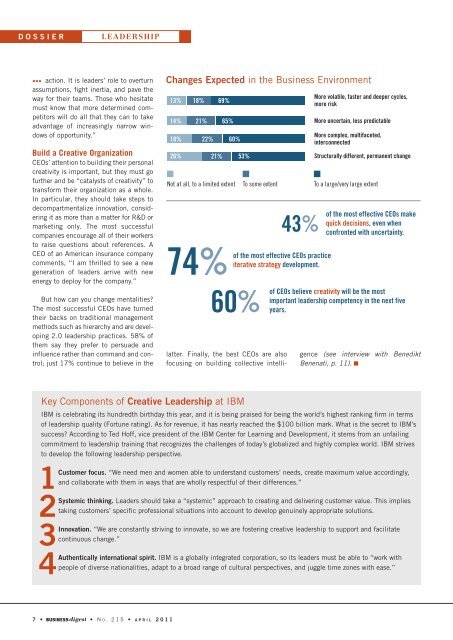Leadership@Infosys - Business Digest
Leadership@Infosys - Business Digest
Leadership@Infosys - Business Digest
You also want an ePaper? Increase the reach of your titles
YUMPU automatically turns print PDFs into web optimized ePapers that Google loves.
D O S S I E R<br />
LEADERSHIP<br />
••• action. It is leaders’ role to overturn<br />
assumptions, fight inertia, and pave the<br />
way for their teams. Those who hesitate<br />
must know that more determined competitors<br />
will do all that they can to take<br />
advantage of increasingly narrow windows<br />
of opportunity.”<br />
Build a Creative Organization<br />
CEOs’ attention to building their personal<br />
creativity is important, but they must go<br />
further and be “catalysts of creativity” to<br />
transform their organization as a whole.<br />
In particular, they should take steps to<br />
decompartmentalize innovation, considering<br />
it as more than a matter for R&D or<br />
marketing only. The most successful<br />
companies encourage all of their workers<br />
to raise questions about references. A<br />
CEO of an American insurance company<br />
comments, “I am thrilled to see a new<br />
generation of leaders arrive with new<br />
energy to deploy for the company.”<br />
But how can you change mentalities?<br />
The most successful CEOs have turned<br />
their backs on traditional management<br />
methods such as hierarchy and are developing<br />
2.0 leadership practices. 58% of<br />
them say they prefer to persuade and<br />
influence rather than command and control;<br />
just 17% continue to believe in the<br />
7 • • N O . 2 1 5 • A P R I L 2 0 1 1<br />
74% 60% of<br />
of the most effective CEOs practice<br />
iterative strategy development.<br />
latter. Finally, the best CEOs are also<br />
focusing on building collective intelli-<br />
Key Components of Creative Leadership at IBM<br />
43%<br />
of the most effective CEOs make<br />
quick decisions, even when<br />
confronted with uncertainty.<br />
CEOs believe creativity will be the most<br />
important leadership competency in the next five<br />
years.<br />
gence (see interview with Benedikt<br />
Benenati, p. 11). ■<br />
IBM is celebrating its hundredth birthday this year, and it is being praised for being the world’s highest ranking firm in terms<br />
of leadership quality (Fortune rating). As for revenue, it has nearly reached the $100 billion mark. What is the secret to IBM’s<br />
success? According to Ted Hoff, vice president of the IBM Center for Learning and Development, it stems from an unfailing<br />
commitment to leadership training that recognizes the challenges of today’s globalized and highly complex world. IBM strives<br />
to develop the following leadership perspective.<br />
1<br />
2<br />
3<br />
4<br />
Changes Expected in the <strong>Business</strong> Environment<br />
13% 18% 69%<br />
14% 21% 65%<br />
18% 22% 60%<br />
26% 21% 53%<br />
More volatile, faster and deeper cycles,<br />
more risk<br />
More uncertain, less predictable<br />
More complex, multifaceted,<br />
interconnected<br />
Structurally different, permanent change<br />
Not at all, to a limited extent To some extent To a large/very large extent<br />
Customer focus. “We need men and women able to understand customers’ needs, create maximum value accordingly,<br />
and collaborate with them in ways that are wholly respectful of their differences.”<br />
Systemic thinking. Leaders should take a “systemic” approach to creating and delivering customer value. This implies<br />
taking customers’ specific professional situations into account to develop genuinely appropriate solutions.<br />
Innovation. “We are constantly striving to innovate, so we are fostering creative leadership to support and facilitate<br />
continuous change.”<br />
Authentically international spirit. IBM is a globally integrated corporation, so its leaders must be able to “work with<br />
people of diverse nationalities, adapt to a broad range of cultural perspectives, and juggle time zones with ease.”


